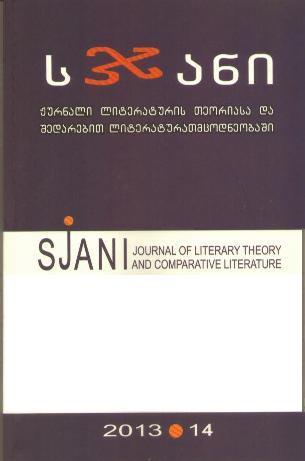რევოლუცია და შემოქმედებითი პროცესი. ქართული ლიტერატურული გამოცდილება
Creativity and Revolution.Experience in Georgian Literarature
Author(s): Irma RatianiSubject(s): Literary Texts
Published by: ლიტერატურის ინსტიტუტის გამომცემლობა
Keywords: Bolshevik Revolution; Rose Revolution; influence; literary process.
Summary/Abstract: Creativity and Revolution. Experience in Georgian Literarature Summary Key Words: Bolshevik Revolution, Rose Revolution, influence, literary process. Revolution is one of the most influential political and social events, able to change the ascertained course in the art and literature and establish the new one. Georgian literature has a remarkable experience in this direction. During the last hundred years the political and social life of Georgia was struck by two different revolutions: the Bolshevik Revolution in 1917-1921 and the Rose Revolution in 2003. The first one was intended to establish the Soviet Ideology, the next one – to destroy it forever; the instrument of the Bolshevik rebellion was violence and death, opposite to it, the instrument of the Rose upheaval was peaceful struggle, aimed to draw Georgia near to international standards of civil society. Georgian literature was very much influenced by each of them. Bolshevik Revolution, which occurred in Russia in 1917, reached Georgia in 1921. Georgia was violently pushed into the union of Soviet Countries - the political product of Communist revolt. Through blood, death and victims Georgian society was pressed towards the “creation” of a “new social model” and “remaking” of human beings according to the ideological pattern of Bolshevism. The quest for “organized good”, relying on force, gradually developed into the organized evil. The transcendental evil and social crisis was reflected through the symbolic of “light” and “dark”. As for literature, the process was marked by the tragic clash between the free-will modernistic and avant-garde trends and artificial Soviet discourse, which lasted for decades and created a painful stage in the history of Georgian culture. In 2003 Georgia once more was involved into the upheaval - Rose Revolution, but this time it was a peaceful demonstration, aiming to dissociate Georgia from its Soviet past and start the inevitable economical, social and political reforms. Georgia faced cardinal changes in many directions. As for art and literature, it was the end of cultural isolation and the beginning of the period of declared liberation. Georgian literature was once again included in the main stream of international literary process. The Rose Revolution proved that the impact of Revolution on literature depends on the means and aims of the revolution and forms of reaction to it.
Journal: სჯანი
- Issue Year: 2013
- Issue No: 14
- Page Range: 154-166
- Page Count: 12
- Language: Georgian

